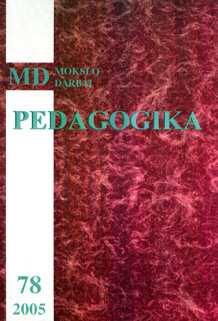Sintezuotas šiuolaikinių studijų modelis
The Synthesized Model of Contemporary Studies
Author(s): Vytautas ŠernasSubject(s): Education
Published by: Vytauto Didžiojo Universitetas
Keywords: gnoseological; synthesized model of the studies; competence; vocational activity.
Summary/Abstract: The aim of the research is to present synthetic paradigm of the studies' activity actualization, its gnoseological, synthesized model which is relevant for the XXI century. The implementation of it should ensure continuous pedagogic studies which are often very important on graduation from a university. In the centre of the synthetic activity paradigm we see a student, a group of students, culture of a country, and a teacher is a guide to one or another vocational activity seeking the main competence of vocational activity: versatile vocational preparation by theoretical and pedagogic attitudes; interiorization of vocational activity; non-automatic discourse, social pedagogue, etc. The main principles of the synthetic activity paradigm: universality or completeness, harmony or consistency and subordination, or dependence [14]. Six levels are necessary for the formation of the synthetic pedagogic activity paradigm competence: a) the level of the need, thought, interest in this activity; b) diagnostic level; c) orientational projective level; d) level of pedagogic activity; e) the level of control, record and assessment as well as self-assessment; f) the level of encouragement, satisfaction or non-satisfaction with one's standard of activity. There are 5 stages in the model of studies according to the synthetic paradigm: 1. the state of existing studies: IDEAL, CONSISTENCY, and RELAXATION on different levels. 2. The state of changes in the results of studies: COMING ACROSS A NEW HINDRANCE, WITH A STUDENT'S NEW NEED FOR SELF-REALIZATION. 3. A wish for changes: STRAIN, BURST, TRANSFORMATION. 4. A new student's state: IDEAL, CONSISTENCY, RELAXATION. This model is a way to continuous studies after graduating from the university.
Journal: Pedagogika
- Issue Year: 2005
- Issue No: 78
- Page Range: 5-9
- Page Count: 5
- Language: Lithuanian

